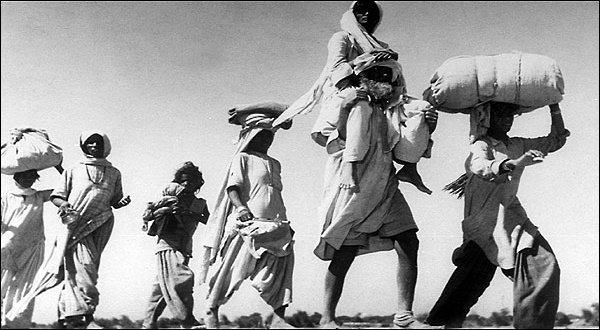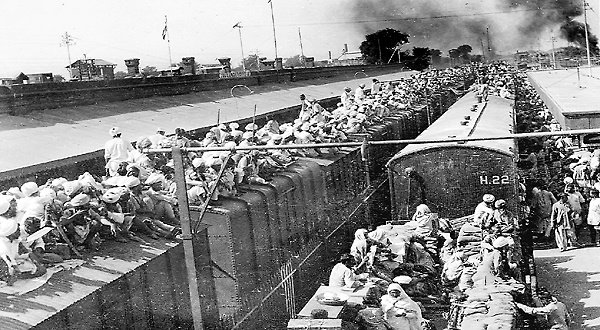
Radcliffe asked for district maps, but there were none available. All that he was given was the ordinary map which hung on the wall of all government offices and educational institutions. He made calculations on that and drew a tentative line on the map itself. Radcliffe never collected his Rs 40,000 fee that the Viceroy had promised because he felt that the blood of 10 million people who lost their lives in the migration rested on his conscience
KULDIP NAYAR
[dropcap]T[/dropcap]he British have the reputation of leaving their colonies in a mess when they have to withdraw by force or otherwise. One method they have adopted is to partition the country they have ruled. They did this in Ireland, Palestine/Israel and of course India.
This is mid August 2016 and l recall the conversation l had with Lord Radcliffe who drew the line to divide India into two countries, India and Pakistan.
Lord Mountbatten, the last Viceroy, picked him up from the British Bar and had him flown to India to divide the subcontinent into two countries. Radcliffe had never set his foot inside India before, nor did he know much about the country. He told me that when Mountbatten spelt out what he wanted, he told him that it was a difficult job which he could not undertake. Mountbatten promised him Rs 40,000, which was a lot of money at that time. But what ultimately tempted him – as he told me – was the responsibility which had been thrown on his shoulders to create two new countries.
For a well known London lawyer the thought of becoming an international statesman overnight was too attractive a proposition to reject.
Radcliffe asked for district maps, but there were none available. All that he was given was the ordinary map which hung on the wall of all government offices and educational institutions. He made calculations on that and drew a tentative line on the map itself. He told me that on this premise the line he drew gave Lahore to India. Then he realized that by doing so, he would deprive Pakistan of any important city. So taking this consideration into mind, he transferred Lahore to Pakistan. To this day the people of the then East Punjab have never forgiven him for the loss of their prize.
Radcliffe never collected his Rs 40,000 fee that the Viceroy had promised because he felt that the blood of 10 million people who lost their lives in the migration rested on his conscience. Nor did he set foot in India after Partition. He died in London and Indian newspapers only picked up the story of his death from the London Times newspaper.
Here was a person who constituted two countries but never got any recognition. He was ultimately denied the status of an international statesman. Many years later when Qaid-e- Azam Mohammad Ali Jinnah, the founder of Pakistan, was angrily asked by his naval aide, who had lost his parents in the migration: Was Pakistan a good thing to have ? The old man kept quiet for a while and replied: l don’t know young man, only posterity will tell.
Probably, it is too early to pronounce any judgement, but one thing is clear that Qaid-e-Azam drew the line dividing the two countries on the basis of religion. This is ironic considering that Jinnah was a man who did not care what he ate or drank. Even though he made Urdu the official language of Pakistan, he himself spoke it only haltingly.
When events were developing in a way where there was no option except Partition, Mahatma Gandhi suggested to Nehru and Patel that they should offer the Prime Ministership of a united India to Jinnah. Both were horrified because each for many years had their eyes on the top job. This indicates that even though they had gone through the fire of the independence struggle, they were not above the greed of office.
In fact the Partition formula was accepted by Nehru and Patel, not Mahatma Gandhi. When Mountbatten was ready with the Partition formula, he invited Mahatma Gandhi first. Gandhi did not want to hear the word “Partition” and walked out of the room when Mountbatten mentioned it.

Patel and Nehru accepted the Partition because they argued with themselves that they were not left with many years of life and if they wanted to build the country, they should accept what Mountbatten offered.
The much demonized Jinnah was not happy with what he called a “moth eaten” Pakistan because the Pakistan of his dream would at least stretch from Peshawar and to Delhi. But he was left with no choice. This was all that the British offered. He was inevitably so bitter that when Mountbatten suggested at the instance of British Prime Minister Clement Attlee that he would accept some linkage between the two newly independent states, Jinnah replied, “I do not trust them (Indians).
Some people to this day say Jinnah would have made a good Prime Minister and this way India could have stayed united. Till then nobody knew that he had malignant cancer. It is suspected that the British knew and only had to wait for some time for him to quit the scene. Since Pakistan was a one person show, probably the idea of the country would have died with him.
Jinnah’s hidden illness was not the reason why Nehru predicted that Pakistan would not last long. His calculation and the calculation of other top Congress leaders was that Pakistan was simply not economically viable.
Never did Nehru and any other Congress leader know how Winston Churchill had promised Jinnah that he personally would see to it that Jinnah would succeed and Pakistan would come into creation. Churchill had a pathological hatred for Hindus and he said he could not understand this polyglot religion. Compared to that Islam was so simple and easy to understand. At the back of his mind were also strategic considerations: Pakistan was geographically so placed that it gave an opening to the oil rich Islamic world on the one hand and the vast Soviet Union on the other. To have a grateful client state like Pakistan was an irresistible attraction.
When l met Radcliffe in London many years later he was living in a flat in the highly desirable location of Bond Street. Therefore it was natural for me to expect some retainers around him. l was surprised when he opened the door himself and put the kettle on the boil to make a cup of tea. He was very reluctant to talk about Partition and his responsibility. But he had to reply to questions when l was face-to-face with him. Regret was written all over his face and he seemed like a person who felt that the killings during Partition were still on his conscience.

